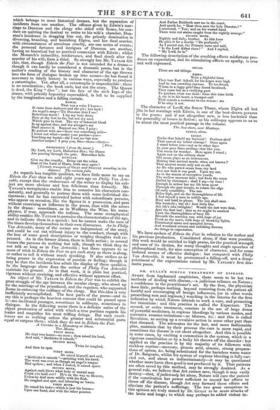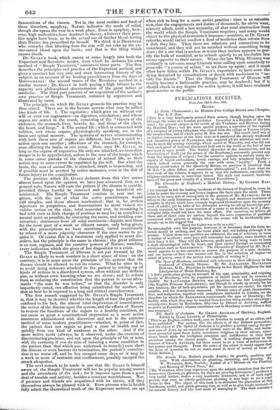DR. GULLY ' S SIMPLE TREATMENT OP DISEASE. APART from haphazard empiricism,
there seem to be but two methods of dealing with disease,—a judicious reliance on Nature ; a confidence in the practitioner's art. By the first, the physician does little, perhaps nothing, beyond removing from the patient all hurtful and encouraging all benign influences, (or in other words prescribing rest and regimen,) watching in the interim for the first indication by which Nature intends to work a cure, and promoting her intentions : and this practice is called the Expectant. The second, or active treatment, consists in the use of large doses of powerful medicines, in copious bleedings by various modes, and extensive counter-irritations—as blisters, &c. : and this is called Revulsion, as setting up a revulsive action in some other part than that diseased. The advocates for the last, and more fashionable plan, maintain that by their process the cure is more rapid, and sometimes the disease is cut short altogether. And this is possible in some cases, by exciting a commotion in the system, which in a vigorous constitution or by a lucky hit throws off the disorder: but applied as the practice is by the majority of its followers with reckless routine—mercury, prussic acid, arsenic, strong prepara- tions of opium, &c. being substituted for the harmless warm water of Dr. Sangrado, whilst his system of copious bleeding is fully car- ried out, and about as indiscriminately—it may be questioned whether more harm than good is not produced by it. That patients are often saved by this method, may be strongly doubted. As a general rule, we believe that Art cannot save, though it may easily destroy—that, if judiciously let alone, Nature will cure the patient if the constitution has power sufficient to second her efforts to throw off the disease, though Art may forward those efforts and alleviate the patient's sufferings. The two great exceptions to this opinion are truly stated by Dr. GULLY to be acute attacks. of the brain and lungs; to which may perhaps be added violent in-
fiammations of the viscera. Yet in the most sudden and fatal of these disorders, apoplexy, Nature indicates the mode of relief, though she opens the vein in a weak place. Even in apoplexy, how- ever, high authorities have doubted in theory, whatever their prac- tice might have been, as to the actual use of further blood-letting than Nature has prescribed for herself. We think it is HEBERDEN who remarks that bleeding from the arm will not take up the ex- travasated blood upon the brain ; and that is the thing which causes death.
Dr. GULLY'S book, which enters at some length into both the Expectant and Revulsive modes, from which be deduces his own method of "Simple Treatment," consists of three parts. The first describes the principles and practice of the Expectant method, and gives a succinct but very able and even interesting history of the subject, in an account of its leading practitioners from the days of
HIPPOCRATES : the second treats of the Revulsive method in a similar manner ; Dr. GULLY in both paying a high tribute to the sagacity and philosophical discrimination of the great father of
medicine. The third part consists of an exposition of the author's own practice of Simple Treatment, enforced by arguments and illustrated by cases.
The principle on which Dr. GULLY grounds his practice may be thus stated. There are in the human system what may be called two kinds of life. 1. The vegetative; which goes on without our will or even our cognizance—as digestion, circulation ; and whose organs are seated in the trunk, consisting of the "viscera of the abdomen, the stomach, liver, bowels, &c. and those of the chest, the heart, and lungs." 2. The animal life ; which is connected with volition, and whose organs, physiologically speaking, are in the brain and spinal marrow. The systems of nerves communicating with both these sets of organs are different, but have a quick re- action upon one another ; affections of the stomach, for example, soon affecting the brain, or vice versa. Now, says Dr. Gum,r, as long as the organs of vegetative life only are attacked, no immediate danger is to be apprehended, unless in the case of the lungs, which in some sense partake of the character of animal life, as their action may to some extent be regulated by the will. But when the brain, the seat of animal life, is attacked, death is impending, and if possible must be averted by active measures, even at the risk of future injury to the constitution.
The practice which Dr. GULLY deduces from this view seems almost based upon the opinion we have just advanced, that, as a general rule, Nature will cure the patient if the disease is curable, provided things hurtful be removed and things beneficial ad- ministered. His Simple Treatment consists in rest and re- gimen, with the use of what the active practitioners would call simples, and those almost mechanical: that is, he prefers injections to purgatives, and fomentations to more violent re- vulsive action on the skin ; total muscular rest, by remaining in bed with even as little change of position as may be ; as complete a mental quiet as possible, by obscuring the room, and avoiding con- versation; abstinence from all solid nutriment—liquids, and those for the most part of a weak or diluent nature, only being given, with the prescriptions we have mentioned, varied occasionally by others of a more physicky character if the case seems to re- quire it. Of course this is a treatment only applied to acute dis- orders, but the principle is the same in chronic : the great reliance is on rest, regimen, and the curative powers of Nature, watching every indication which she gives of her disposition to a crisis.
The Simple Treatment of Disease is not put forward by Dr. Goma- as likely to work wonders in a short space of time : on the contrary, it is in some sense the principle of his system that the disease should be allowed to run its course. What he aims at is, to avoid doing unknown mischief to the patient by setting up all kinds of actions in a disordered system, often without any definite aim, or without even knowing what we are about; and to refrain from so reducing the constitution that the patient is never after- wards "the man he was before," or that the disorder is only imperfectly cured, one affection being substituted for another, or that at best he is exposed to a long and critical convalescence.
The first remark suggested by Dr. GULLY'S Simple Treatment is, that it may be doubted whether the length of time the patient is confined to his bed, the almost total deprivation of nourishment, the action of the disease upon the system, and the efforts of Nature to restore the functions of the organs to a healthy condition, do not cause as great a constitutional depression as a more active treatment administered with discretion and not in the extreme method of some modern practitioners—whether, in point of fact, the patient does not regain as good a state of health and as quickly from one kind of weakness as the other. And if the more active mode (always, be it observed, under the exercise of discriminating prudence, and not upon the principle of hit or miss, with the certainty if you do miss of inducing a worse condition in the patient than that which you undertook to remedy) cuts short the disease or even hastens its termination, the patient's constitu- tion is no worse off, and he has escaped some days or it may be a week or more of restraint and confinement, possibly escaped the attack altogether.
The next remark to be made is one that Dr. GULLY is himself aware o4 the Simple Treatment will not be popular among nurses and the attendants of the sick ; for it imposes upon them a good deal of trouble and activity, besides a constant watchfulness. Nor, if patients and friends are acquainted with its nature, will they themselves always be pleased with it. Even persons who in health fully admit the theoretical troth of the Expectant method, are apt when sick to long for a more active practice : time is so valuable now, that the engagements and duties of thousands, far above want, scarcely admit, until a last necessity, of that total abstraction from the world which the Simple Treatment requires ; and many would object to the physical restraints it imposes—numbers, as Dr. Gomm remarks, would rather swallow a dose of medicine than refrain front a dish they like. Then there are relations and connexions to be considered, and they will not be satisfied without something being done ; for a stir that is useless or worse than useless appears to gra- tify the bulk of mankind, as to submit quietly to an inevitable fate seems opposite to their nature. When the late Whig Ministry was evidently in extremis, many Liberals were calling upon somebody to prescribe "a course of action" to set them up again : and it must often have fallen within Dr. Gutax's experience to have seen the dying disturbed by consultations or dosed with medicines to "sa- tisfy the friends." That the Simple Treatment of Disease will readily become a fashionable practice, may be doubted ; but if it should check in any degree the active system, it will have rendered good service to the public.



























 Previous page
Previous page